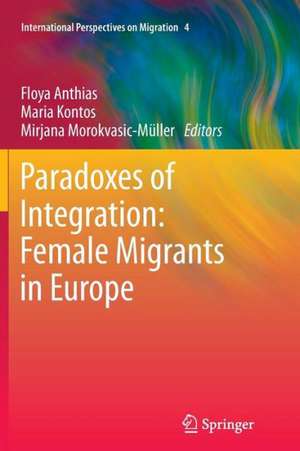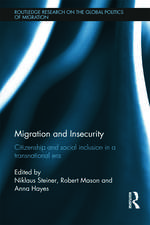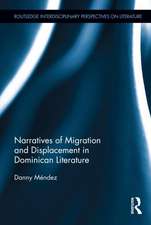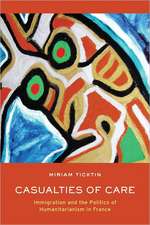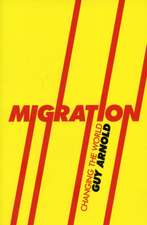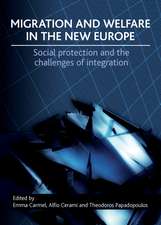Paradoxes of Integration: Female Migrants in Europe: International Perspectives on Migration, cartea 4
Editat de Floya Anthias, Maria Kontos, Mirjana Morokvasic-Mülleren Limba Engleză Paperback – 14 dec 2014
| Toate formatele și edițiile | Preț | Express |
|---|---|---|
| Paperback (1) | 727.48 lei 38-44 zile | |
| SPRINGER NETHERLANDS – 14 dec 2014 | 727.48 lei 38-44 zile | |
| Hardback (1) | 737.60 lei 38-44 zile | |
| SPRINGER NETHERLANDS – noi 2012 | 737.60 lei 38-44 zile |
Din seria International Perspectives on Migration
-
 Preț: 276.18 lei
Preț: 276.18 lei - 15%
 Preț: 695.85 lei
Preț: 695.85 lei - 18%
 Preț: 735.38 lei
Preț: 735.38 lei - 18%
 Preț: 945.79 lei
Preț: 945.79 lei - 15%
 Preț: 646.30 lei
Preț: 646.30 lei -
 Preț: 394.87 lei
Preț: 394.87 lei - 15%
 Preț: 647.92 lei
Preț: 647.92 lei -
 Preț: 394.87 lei
Preț: 394.87 lei -
 Preț: 393.52 lei
Preț: 393.52 lei - 15%
 Preț: 642.51 lei
Preț: 642.51 lei - 18%
 Preț: 733.65 lei
Preț: 733.65 lei -
 Preț: 392.97 lei
Preț: 392.97 lei - 15%
 Preț: 640.24 lei
Preț: 640.24 lei - 15%
 Preț: 637.78 lei
Preț: 637.78 lei - 15%
 Preț: 644.95 lei
Preț: 644.95 lei - 20%
 Preț: 565.89 lei
Preț: 565.89 lei - 18%
 Preț: 730.35 lei
Preț: 730.35 lei - 24%
 Preț: 644.82 lei
Preț: 644.82 lei - 15%
 Preț: 644.82 lei
Preț: 644.82 lei
Preț: 727.48 lei
Preț vechi: 957.21 lei
-24% Nou
Puncte Express: 1091
Preț estimativ în valută:
139.21€ • 145.71$ • 115.86£
139.21€ • 145.71$ • 115.86£
Carte tipărită la comandă
Livrare economică 26 martie-01 aprilie
Preluare comenzi: 021 569.72.76
Specificații
ISBN-13: 9789400796423
ISBN-10: 9400796420
Pagini: 212
Ilustrații: VIII, 204 p.
Dimensiuni: 155 x 235 x 11 mm
Greutate: 0.3 kg
Ediția:2013
Editura: SPRINGER NETHERLANDS
Colecția Springer
Seria International Perspectives on Migration
Locul publicării:Dordrecht, Netherlands
ISBN-10: 9400796420
Pagini: 212
Ilustrații: VIII, 204 p.
Dimensiuni: 155 x 235 x 11 mm
Greutate: 0.3 kg
Ediția:2013
Editura: SPRINGER NETHERLANDS
Colecția Springer
Seria International Perspectives on Migration
Locul publicării:Dordrecht, Netherlands
Public țintă
ResearchCuprins
Acknowledgments.- Introduction: Paradoxes of Integration: Floya Anthias, Mirjana Morokvasic-Müller and Maria Kontos.- 1. Profiling Female Migrants in Europe: categories of difference: Ron Ayres, Tamsin Barber, Floya Anthias and Maja Cederberg.- 2. Welfare Regimes, Labour Markets, Policies: the Experiences of Migrant Women: Floya Anthias, Maja Cederberg, Tamsin Barber and Ron Ayres.- 3. Informalization and Flexibilization at work: The Migrant Women Precariat speak: Nicos Trimikliniotis and Mihaela Fulias-Souroulla.- 4. Coping with Deskilling: Strategies of Migrant Women across European Societies: Anna Vouyioukas and Maria Liapi.- 5. Civic Participation of Migrant Women: Employing Strategies of Active Citizenship: Mojca Pajnik, and Veronika Bajt.- 6. Female Migrants and the Issue of Residence Rights: Karolina Krzystek.- 7. Family Matters: Migrant Domestic and Care Work and the Issue of Recognition: Christine Catarino, Maria Kontos and Kyoko Shinozaki.- 8. Blurred Lines: Policies and Experience of Migrant Women in Prostitution and Entertainment: Christine Catarino and Mirjana Morokvasic-Müller.- 9. Trafficking and Women’s Migration in a Global Context: Giovanna Campani and Tiziana Chiappelli.- Notes on the Contributor.
Textul de pe ultima copertă
This timely and innovative book analyses the lives of new female migrants in the EU with a focus on the labour market, domestic work, care work and prostitution in particular. It provides a comparative analysis embracing eleven European countries from Northern (UK, Germany, Sweden, France), Southern (Portugal, Spain, Italy, Greece, Cyprus) and Eastern Europe (Poland, Slovenia), i.e. old and new immigration countries as well as old and new market economies. It maps labour market trends, welfare policies, migration laws, patterns of employment, and the working and social conditions of female migrants in different sectors of the labour market, formal and informal. It is particularly concerned with the strategies women use to counter the disadvantages they face. It analyses the ways in which gender hierarchies are intertwined with other social relations of power, providing a gendered and intersectional perspective, drawing on the biographies of migrant women. The book highlights policy relevant issues and tries to uncover some of the contradictory assumptions relating to integration which it treats as a highly normative and problematic concept. It reframes integration in terms of greater equalisation and democratisation (entailed in the parameters of access, participation and belonging), pointing to its transnational and intersectional dimensions.
Caracteristici
Provides lived experiences of migrant women and their strategies in Europe Comparative perspective on labour markets, migration policies, welfare regimes and Integration policies The uses of the concept of integration in public and policy discourse and migration research Focus on migrant women in different labour markets and particularly as domestic workers, sex workers and victims of trafficking
